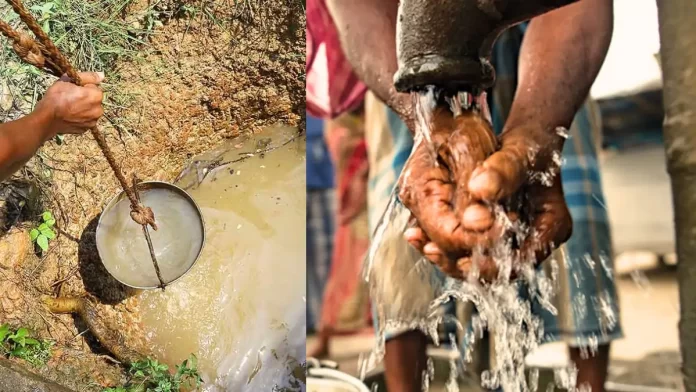In a troubling health crisis, Nerali village, located in Maharashtra’s Nanded district, has been struck by a wave of waterborne poisoning, sending shockwaves through the small, rural community. Over 100 villagers have been affected, with many being rushed to hospitals for treatment of severe symptoms. Local authorities have now launched an urgent investigation to determine the cause of the contamination and prevent further outbreaks.
The Incident
Late one evening, the first symptoms began to surface among the residents. Several villagers complained of nausea, vomiting, diarrhea, and dizziness. By the early hours of the morning, the numbers had surged, with entire families suffering from the sudden onset of illness. Emergency services were promptly mobilized, and victims were transferred to both government and private hospitals for treatment.
Dr. Vishal Patil, a local health official overseeing the response, described the symptoms as consistent with waterborne poisoning. “The patients are experiencing symptoms typically associated with the consumption of contaminated water or food. While most of the cases have been stabilized, we remain on high alert, given the volume of those affected,” he stated.
The number of reported cases continued to rise throughout the night, with medical facilities in the region quickly becoming overwhelmed. In response, additional health teams were deployed to Nerali to provide medical support and manage the ongoing crisis.
Source of Contamination
Preliminary investigations point to the village’s public water supply as the likely culprit. The water tank that supplies Nerali’s homes and farms is believed to have been contaminated with a toxic substance, though the exact cause remains under investigation. According to local sources, the tank had not been cleaned or inspected in recent months, raising concerns about negligence in maintaining the village’s water infrastructure.
“We are currently testing samples from the water supply to identify any pathogens or toxins that may be present. Our priority is to ensure the safety of the villagers and prevent this from happening again,” said Dr. Patil. In the meantime, authorities have advised residents to avoid drinking water from the contaminated source and have arranged for bottled water and alternative supplies to be distributed.
Impact on the Village
For a village as small and close-knit as Nerali, the outbreak has had a profound impact. Many of the affected families rely on agriculture for their livelihoods, and the poisoning has disrupted daily life in ways that extend beyond immediate health concerns. Farmers have been unable to tend to their crops, and local schools have been temporarily closed as a precautionary measure to prevent the spread of the illness.
Sunil More, a villager whose family was impacted, described the panic that set in as more people fell ill. “It started with just a few cases, but within hours, it seemed like half the village was sick. We were scared—no one knew what was causing it or how to protect ourselves,” More explained.
Government Response
The district administration has taken swift action to contain the situation and ensure it does not escalate further. In addition to sending medical teams, the government has ordered a comprehensive inspection of all public water sources in the area. They are also distributing medical supplies and providing compensation for families affected by the outbreak.
Local officials have vowed to take strict action if negligence is found to have contributed to the contamination. District Collector Rajesh Deshmukh emphasized the importance of clean water in rural areas like Nerali, saying, “This incident underscores the need for proper infrastructure and regular maintenance of essential services. We will be conducting a full review to ensure that this kind of situation does not happen again.”
Expert Opinions and Long-Term Solutions
Health experts say that rural areas like Nerali are particularly vulnerable to waterborne illnesses due to insufficient infrastructure and lack of oversight. The World Health Organization (WHO) has frequently highlighted the risks of contaminated water supplies in rural India, where poor sanitation, inadequate waste disposal, and intermittent maintenance contribute to recurring outbreaks of diseases like cholera and dysentery.
Dr. Anita Sharma, a waterborne disease specialist, pointed out, “This case illustrates a larger, ongoing issue in rural India—many villages rely on outdated or poorly maintained water systems. Without proper filtration or regular cleaning, these systems can become breeding grounds for harmful bacteria or toxins. Preventive measures, such as routine inspections, filtration systems, and water testing, need to be made a priority.”
To prevent similar incidents in the future, health authorities are urging the implementation of stricter guidelines for the maintenance of water tanks and distribution systems. Public awareness campaigns about safe water consumption and proper sanitation are also being proposed to educate villagers about protecting their health.
As Nerali village grapples with the aftermath of this outbreak, the incident serves as a stark reminder of the critical need for clean water infrastructure and diligent oversight. While authorities work to restore the community’s water supply, the affected villagers are left recovering from an illness that shook their lives overnight. The hope remains that this crisis will push local governments to improve water safety and prevent future tragedies.
Must Read: Shiv Sena Leader (UBT) Sanjay Raut Sentenced to 15 Days in Defamation Case






